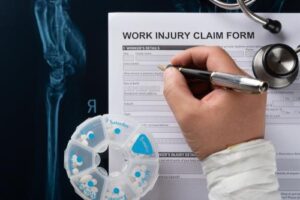
Whether an injury is work-related is typically determined by your employer’s workers’ compensation insurance provider, guided by state laws and the specific details of your injury.
However, the process isn’t always straightforward, and disputes can arise, especially if the insurance company or employer questions your claim.
While this might sound overwhelming, an Atlanta workers’ compensation lawyer who understands how work-related injuries are evaluated can help you protect your rights and ensure you get the compensation you deserve. Let’s break it down.
What Does “Work-Related” Mean?
To be considered work-related, an injury must happen because of your job or while performing work-related duties. This doesn’t necessarily mean it has to happen at your workplace. For example, if you’re driving for a work errand, attending a required off-site training, or even working from home, your injury could still qualify as work-related.
However, there are exceptions. Injuries that happen during lunch breaks, while commuting to and from work, or while engaging in horseplay at work are less likely to qualify, though there can be exceptions depending on the circumstances.
Get the strong arm
Who Makes the Initial Determination About Your Work-Related Injury?
After you report your injury to your employer, the responsibility for deciding whether it’s work-related typically falls to your employer’s workers’ compensation insurance provider.
This decision isn’t made on a whim—it’s the result of a detailed investigation that aims to determine whether your claim meets the requirements outlined by your state’s workers’ compensation laws.
Here’s how the process usually unfolds:
Reviewing Your Injury Report
The first step is evaluating the injury report you submitted to your employer. This document contains critical details about when, where, and how the injury occurred. Did it happen during your regular job duties? Was it on company property? Were there witnesses? The accuracy and completeness of your report play a key role in how your claim is assessed.
Speaking With Your Employer and Coworkers
The insurance company may reach out to your employer and even coworkers to gather more context about the incident. They’ll want to confirm the details of your injury and assess whether anything suggests it wasn’t work-related. For example, if coworkers dispute your version of events, it could complicate your claim.
Reviewing Medical Records
Your medical records are pivotal in determining the severity and cause of your injury. The insurer will examine whether your doctor’s diagnosis supports the idea that your injury was caused by your work duties.
They may also check if you received prompt medical treatment and followed the procedures required by workers’ compensation laws (such as seeing an approved doctor, if your state mandates it).
Evaluating the Circumstances
The insurer will look at the broader circumstances surrounding your injury. For example:
- Were you performing a task directly related to your job when the injury occurred?
- Was the injury the result of your employer’s negligence, faulty equipment, or unsafe conditions?
- Did your own actions (such as disregarding safety protocols) contribute to the injury?
This evaluation helps the insurer decide whether your injury meets the definition of “work-related” under the law.
Factors That May Complicate the Determination
While the process may seem straightforward, many factors can complicate the determination of whether an injury is work-related. For instance:
- Delayed Reporting: If you waited days or weeks to report your injury, the insurer might argue that it didn’t happen at work or that it wasn’t severe enough to warrant immediate attention.
- Pre-Existing Conditions: If you have a medical history of similar injuries or conditions, the insurer may claim that your injury wasn’t caused by your job but was instead a pre-existing issue.
- Off-Site Injuries: Injuries that happen outside of your usual workplace, such as while traveling for work, can be harder to prove as work-related.
- Disputed Facts: If your employer disputes your claim, for example, by saying you weren’t performing your job duties when the injury occurred, it can lead to delays or denials.
Because the insurance company’s goal is to minimize payouts, they may interpret these factors in ways that don’t work in your favor. That’s why it’s important to ensure that your injury report, medical documents, and any other evidence clearly support your claim.
The Insurance Company’s Final Decision
Once the insurance company has gathered all this information, it’ll make a determination about your claim. Their decision will be based on whether your injury meets the legal and factual requirements for a work-related injury under your state’s workers’ compensation laws.
If they approve your claim, you’ll receive benefits to cover medical expenses, lost wages, and potentially other costs like rehabilitation.
However, if your claim is denied, the process doesn’t end there. You have the right to appeal the insurer’s decision and present additional evidence to strengthen your case. An Atlanta personal injury lawyer can guide you through this process and help ensure that your rights are protected.
What if Your Claim Is Denied?
Unfortunately, not all claims are approved. Insurance companies may deny your claim if they believe your injury wasn’t caused by your work, if it happened outside of your job duties, or if there’s insufficient evidence to support your claim.
For example, if your employer argues that your injury happened during a personal activity instead of work, the insurer might deny coverage. Similarly, if you delayed reporting your injury or sought medical treatment from an unauthorized provider, it could complicate the process.
If your claim is denied, don’t lose hope. You have the right to appeal the decision and present evidence to support your case, such as witness statements, medical records, or workplace documentation.
Why You Shouldn’t Handle This Alone
Determining whether an injury is work-related can quickly become a complex and stressful process. Insurance companies don’t always have your best interests in mind, and employers may contest your claim to avoid higher insurance premiums. This is why it’s critical to have someone in your corner who understands the system and can advocate for your rights.
At John Foy & Associates, we can help you through the workers’ compensation process. If your claim is denied or you’re unsure about your rights, we’re here to provide support and fight for the compensation you deserve.
Call us today for a free consultation—we’ll handle the legal burden so you can focus on recovery.
(404) 400-4000 or complete a Free Case Evaluation form





